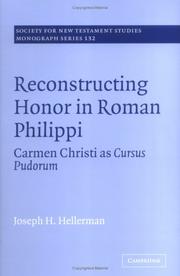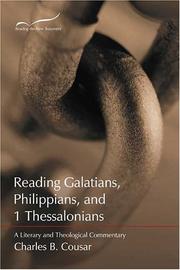| Listing 1 - 7 of 7 |
Sort by
|
Book
ISBN: 1683590139 9781683590132 9781683590125 1683590120 1683590120 Year: 2017 Publisher: Bellingham, WA : Lexham Press,
Abstract | Keywords | Export | Availability | Bookmark
 Loading...
Loading...Choose an application
- Reference Manager
- EndNote
- RefWorks (Direct export to RefWorks)

ISBN: 0521849098 0521090830 1107153212 0511182066 0511115822 0511299982 0511487975 1280431482 0511199287 051111527X 9780511115820 9780511487972 9786610431489 6610431485 9780521849098 Year: 2005 Volume: 132 Publisher: New York Cambridge University Press
Abstract | Keywords | Export | Availability | Bookmark
 Loading...
Loading...Choose an application
- Reference Manager
- EndNote
- RefWorks (Direct export to RefWorks)
This book examines Paul's letter to the Philippians against the social background of the colony at Philippi. After an extensive survey of Roman social values, Professor Hellerman argues that the cursus honorum, the formalized sequence of public offices that marked out the prescribed social pilgrimage for aspiring senatorial aristocrats in Rome (and which was replicated in miniature in municipalities and in voluntary associations), forms the background against which Paul has framed his picture of Jesus in the great Christ hymn in Philippians 2. In marked contrast to the values of the dominant culture, Paul portrays Jesus descending what the author describes as a cursus pudorum ('course of ignominies'). The passage has thus been intentionally framed to subvert Roman cursus ideology and, by extension, to redefine the manner in which honour and power were to be utilized among the Christians at Philippi.
Bible --- Criticism, interpretation, etc --- Bible. Philippians --- Arts and Humanities --- Religion --- Bible. --- Criticism, interpretation, etc. --- Epistle of Paul to the Philippians --- Epistle to the Philippians --- Letter of Paul to the Philippians --- Philippians --- Pillipo (Book of the New Testament)

ISBN: 1589833104 142941104X 9781429411042 9781589833104 1589831721 9781589831728 Year: 2005 Publisher: Atlanta Society of Biblical Literature
Abstract | Keywords | Export | Availability | Bookmark
 Loading...
Loading...Choose an application
- Reference Manager
- EndNote
- RefWorks (Direct export to RefWorks)
Christianity. --- Christianity --- Religions --- Church history --- Bible. --- Epistle of Paul to the Philippians --- Epistle to the Philippians --- Letter of Paul to the Philippians --- Philippians --- Pillipo (Book of the New Testament) --- Epistles of Paul --- Paul, Epistles of --- Paul Sŏsin --- Pauline epistles --- Risālat al-Qiddīs Būlus al-rasūl al-thāniyah ilá Tīmūthīʼūs --- Theology. --- Criticism, interpretation, etc.
Book
ISBN: 1282415913 9786612415913 0300157703 9780300157703 9781282415911 9780300140453 0300140452 6612415916 Year: 2008 Publisher: New Haven Yale university press
Abstract | Keywords | Export | Availability | Bookmark
 Loading...
Loading...Choose an application
- Reference Manager
- EndNote
- RefWorks (Direct export to RefWorks)

ISBN: 1573129674 9781573129671 1573123234 9781573123235 Year: 2001 Publisher: Macon, Ga.
Abstract | Keywords | Export | Availability | Bookmark
 Loading...
Loading...Choose an application
- Reference Manager
- EndNote
- RefWorks (Direct export to RefWorks)
Bible --- Bible. --- Thessalonians 1 (Book of the New Testament) --- Epistle of Paul to the Philippians --- Epistle to the Philippians --- Letter of Paul to the Philippians --- Philippians --- Pillipo (Book of the New Testament) --- Brief aan die Galasiërs --- Epistle to the Galatians (Book of the New Testament) --- Galasiërs --- Galatians (Book of the New Testament) --- Galladia --- Galladia-sŏ --- Galladiasŏ --- Garateya sho --- Kalladiasŏ
Book
ISBN: 162837098X 1628370971 1628370963 9781628370973 9781628370980 9781628370980 9781628370966 9781628370973 Year: 2015 Publisher: Atlanta
Abstract | Keywords | Export | Availability | Bookmark
 Loading...
Loading...Choose an application
- Reference Manager
- EndNote
- RefWorks (Direct export to RefWorks)
Bible. --- Criticism, interpretation, etc. --- Philippi (Extinct city) --- Church history. --- Civilization. --- Epistle of Paul to the Philippians --- Epistle to the Philippians --- Letter of Paul to the Philippians --- Philippians --- Pillipo (Book of the New Testament) --- Crenides (Extinct city) --- Fílippoi (Extinct city) --- Krenides (Extinct city) --- Philippes (Extinct city) --- Philippi (City) --- Philippoi (Greece : Extinct city) --- Greece --- Antiquities

ISBN: 9780511487996 9780521804066 9780521036245 0511018363 9780511018367 0511487991 0511043902 9780511043901 052180406X 1107123569 0521036240 0511174276 1280433388 0511154038 0511328192 Year: 2001 Volume: 112 Publisher: Cambridge Cambridge University press
Abstract | Keywords | Export | Availability | Bookmark
 Loading...
Loading...Choose an application
- Reference Manager
- EndNote
- RefWorks (Direct export to RefWorks)
Rhetorical criticism seeks to understand and comment on the way texts function in their social and cultural contexts. Holloway puts Paul's letter in the context of ancient theories and literary practices of 'consolation' and argues that Paul wrote to the Philippians in order to console them. Holloway shows that the letter has a unified overall strategy and provides a convincing account of Paul's argument. The book falls into two parts. Part I explores the integrity of Philippians, the rhetorical situation of the letter, and ancient consolation as the possible genre of Philippians, while Part II examines Phil. 1:3-11; 1:12-2:30; 3:1-4:1 and 4:2-23. The exegetical studies in Part II focus on the consolatory topoi and arguments of Philippians.
Consolation in the Bible --- 227.1*5 --- Brief van Paulus aan de Filippenzen --- Bible. --- Epistle of Paul to the Philippians --- Epistle to the Philippians --- Letter of Paul to the Philippians --- Philippians --- Pillipo (Book of the New Testament) --- Socio-rhetorical criticism. --- 227.1*5 Brief van Paulus aan de Filippenzen --- Consolation in the Bible. --- Bible NT. Epistles of Paul. Philippians --- Bible. Philippians --- Socio-rhetorical criticism --- Arts and Humanities --- Religion
| Listing 1 - 7 of 7 |
Sort by
|

 Search
Search Feedback
Feedback About UniCat
About UniCat  Help
Help News
News